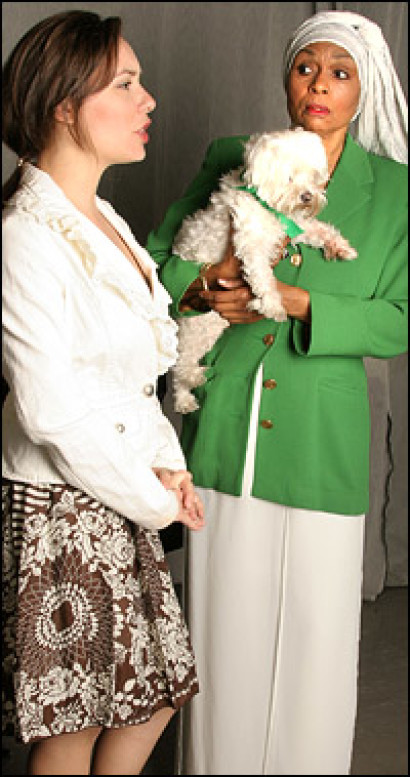New York Times
THEATER REVIEW | ‘THE SECOND TOSCA’
Opera’s Inner Soap Dishes the Divas
By ANNE MIDGETTE JUNE 18, 2007
An opera wife I know used to describe the atmosphere backstage as “ ‘Peyton Place’ with classical music in the background.” In “The Second Tosca,” which opened June 13 at the 45th Street Theater, the playwright Tom Rowan taps the comic potential of this promising environment. The aging diva trying for one more triumph? The ambitious, coldhearted conductor? Sex, jealousy and the ghosts of the past? They are all here, drawn in enough detail to transcend mere caricature, brought to life by an excellent cast and enlivened with a lot of humor. The piece is not without its flaws; still, even nonopera lovers should enjoy themselves.
“The Second Tosca” leaves open to question just how much of an opera lover Mr. Rowan is himself. He is very good at character and plot, and it is a fine sign that the second act is better than the first: endings are harder than beginnings. But the parts that deal specifically with the opera world feel more researched than natural. Mr. Rowan keeps sticking in educational bits, explanations of opera terms or figures; not all of them ring true, and not all of them are needed. Cutting out some of the Opera 101 information would not only strengthen the piece but also, helpfully, shorten it. (Kevin Newbury, the director, evidently tried to speed things up by encouraging a rapid-fire, blink-and-you’ll-miss-it delivery that can get a little overheated but adds an adrenalin jolt.)
Because there are gaps in Mr. Rowan’s understanding of how the opera world actually works, the title character is the most problematic. The “Second Tosca,” Lisa Duvall (Rachel de Benedet), is the understudy and the lead singer in one performance in a run of “Tosca” at a California opera house. In trying to show her ambivalence about opera’s traditions, and her struggle to find her own identity, Mr. Rowan sometimes has her do things that are not quite credible (like asking, when offered a plum role because a singer has canceled, whether she can’t have another role in the same opera instead). Ms. de Benedet, however, does a lovely job with the part.
Opera houses breed stereotypes, and Mr. Newbury plays them to the hilt; what saves the piece is that each character has a plausible point of view. Even the calculating conductor Aaron Steiner (Mark Light-Orr) is not simply a bad guy; his views on the focus necessary for a career actually make more sense than Lisa’s self-absorbed “finding myself” protestations.
Some stereotypes are better than others. Carrington Vilmont is sympathetic as Lisa’s brother-manager, Stephen Duvall, an opera queen with a knack for biting one-liners. Excess comes out in the callow Nathaniel, a composition student and adoring fan of Lisa’s played almost too awkwardly by Jeremy Beck, and in the ditsy Darcy (Melissa Picarello), an aspiring singer and personal assistant to the diva Gloria Franklin. In real life Darcy could never be so clueless after five years in that job. There is even a ghost: Angela Rinucci (played by Eve Gigliotti, the one real opera singer in the cast), who died playing Tosca in 1958, flits around the theater singing opera excerpts.
The tour de force is Vivian Reed’s note-perfect portrayal of Gloria, the grande dame, complete with affectations, insecurities, dramatic monologues and even a respectably sung phrase from “Tosca,” thank you very much.

